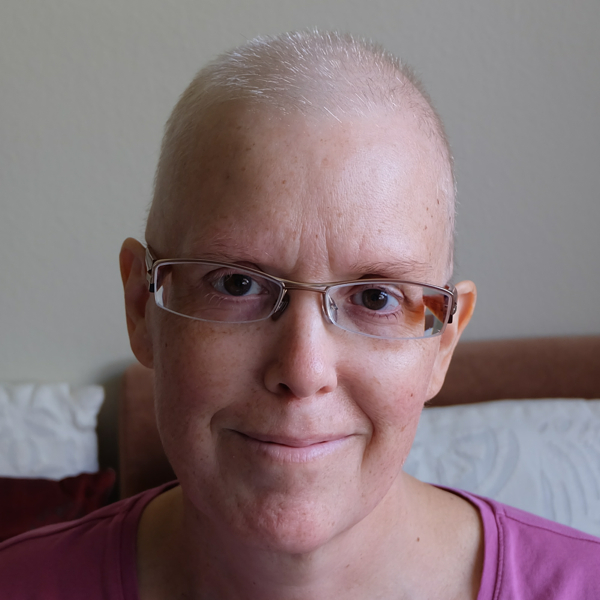I originally wrote this in January 2016 and submitted it to Cracked.com, which I was greatly enjoying at the time. Never heard back from them, so here it is.
There are about a bazillion different types of cancer. Not all of them require or even benefit from chemotherapy, but, when we hear “cancer”, chemo is what we tend to immediately think of, and fear the most. Except, of course, dying.
I have “difficult” breasts, and I’ve had cancer scares before. Each time, the most frightening possible outcome, to me, was chemo (yes, chemo scared me more than death). My nightmare finally came true: in late 2014 I was diagnosed with breast cancer requiring surgery and then chemotherapy (followed by radiation and hormonal therapy).
While chemotherapy may well save my life (we’ll get to that), it has proved in some ways to be almost as bad as I’d feared – and, in other ways, even worse.
#7 Yes, you can lose ALL your hair. And your nails
Part of the reason cancer is dangerous is that cancer cells multiply quickly. Some chemotherapy drugs work by killing cells that grow quickly. Problem is, the drugs can’t distinguish between the fast-growing cells we want to get rid of (cancer) and the ones we’d like to keep (hair follicles). That’s why one of the most famous side effects of chemotherapy is going bald, and there’s a lot of money made in wigs, hats, and head scarves for women who have cancer.
Of course you have hair follicles all over your body. Your arms, legs, pubic area and armpits will also go bald. Depending how you feel, aesthetically and/or politically, about body hair, this side effect might be welcome. But you’ll probably not be thrilled to lose your eyebrows and eyelashes.
Different types and areas of hair go unpredictably, and not on the same schedule. In my case, the hair on my head started growing back, slowly, while my lashes and brows were still falling out. Later, after my eyebrows had started to grow back, they suddenly and completely fell out again. And now they’re growing back for the second time. Apparently this cycle could continue for a year or so. So I can “enjoy” looking like Grima Wormtongue for a while yet. (My eyebrows never did come back. As of 2024 I’ve had them tattooed on three times.)
More painfully, chemo can also affect the nailbeds that your finger- and toenails grow from, causing discoloration, cracking, peeling, soreness, and even losing nails entirely. They’ll eventually grow back, but, in the meantime, there are many simple household tasks, such as opening snap-top plastic lids, that become difficult when all your fingertips hurt and you’re afraid you might tear a nail completely off in the process. I eventually lost half a nail to a child’s car seat, with a loud shriek of pain – right into the ear of the child I was buckling in.
#6 You may be literally full of shit
Medical treatment often leaves you very little dignity. The side effects of chemotherapy that no one likes to talk about have to do with bowel control, or lack of. Chemotherapy can cause diarrhea, but it more often causes severe constipation. But you don’t know which you’ll get! (Over the course of chemo, you might get both. Bonus!)
What I got was rolling waves of abdominal cramps, eventually so prolonged and painful that my oncologist sent me for a CT scan of my lower abdomen. Which came back saying that I was fine, except for severe constipation. Yes, I was simply full of shit. The doctor’s prescription of prunes and fiber more or less took care of that, but I’m still spending a lot of time on the toilet (I play Bejeweled on my iPad, high score to date over 2 million).
#5 But everything else… runs
Losing ALL your hair includes the little hairs in your nostrils, the ones that you’ve always been told are there to filter dust particles out of the air you breathe. Turns out they have another function as well: to prevent the gunk in your nose from simply running down your face. Especially if you’re having chemo during allergy season, you’ll have to blow or wipe continuously to avoid a toddler-style constant nose dribble.
One critical side effect of chemo is low blood cell counts, which (among more serious effects) increases your tendency to bleed, even from minor wounds. With an irritated nasal lining, this also means snorting out blood every time you blow.
Your eyes also get super-sensitive, and react strongly to irritants like dust and pollen. The minute I walk outside, tears start running down my face, and do not stop until I’m indoors again. No wonder people on the street feel sorry for me – I look like I’m crying uncontrollably (which I am), even when I’m in a good mood (which, in the final weeks of chemo, wasn’t often). This side effect is still with me seven months post-chemo.
#4 Even if you’re not nauseated, and are hungry, you may still not want to eat
Although nausea and hairlessness are the best-known side effects of chemotherapy, not every chemo drug causes nausea and, for those that do, there are very good anti-emetic drugs that your oncologist should be happy to load you up on. The doctors don’t want you to get to the vomiting stage because, at that point, it’s hard to keep down the drugs that you need to control the vomiting (duh!). These drugs worked great for me, and I never vomited from chemo. (The drugs made me stoned, but that’s a separate problem.)
However, there are other phenomena beyond nausea that make eating difficult.
The fast-growing cells in your body hit by chemo also include your tastebuds. Even if you still have some sense of taste, most of what you eat tastes… off. I largely lost the ability to taste salt, which made almost everything that’s not strictly sweet or bitter taste wrong. This was surprisingly upsetting and depressing, especially when I was very hungry, would try familiar foods that I love, and find that I suddenly hated them. At one point I was getting a lot of my nutrition from chocolate, quesadillas, and beer.
Chemo also causes dry mouth. Without saliva to soften them, some dry or doughy foods turn into unswallowable lumps of… well, dough.
Related to the dryness, chemo can cause horrendous mouth sores. I didn’t have this too badly, but I did manage to cut my mouth on a piece of toast once. Some chemo patients are reduced to eating only liquid or very soft foods. For me, what food critics call “mouthfeel” became very important.
All of this changes throughout the course of chemo, so one week I would find some magic food that was still appealing, and the next week that, too, would start tasting horrible.
Dry mouth also means that you need constant hydration, which the doctors recommend for other reasons as well. I’ve always been a big fan of drinking water – during the day. But at night I kept waking up to drink because my mouth felt like [insert typically over-the-top Cracked metaphor here]. Do that a dozen times a night and, of course, you’ll need to get up to pee. Often. Did I mention that insomnia and fatigue are also side effects of chemo?
#3 No one tells you exactly what side effects you’ll have, or how bad they will be
Largely because they don’t know. Each chemo drug has a long list of possible side effects, but not everyone gets all of them, and they manifest to varying degrees in different people, for reasons no one understands. For some side effects, researchers don’t even know exactly how the chemo causes them. [“The incidence of de novo or worsening hypertension in association with these drugs varies between 17% and 80%. The mechanism is not well understood and continues to be investigated.” http://www.ncbi.nlm.nih.gov/pmc/articles/PMC3113122/ ] For that matter, they don’t really know how some forms of chemotherapy work to begin with.
One thing all the medical experts seem sure of is that some effects, such as fatigue, get worse as treatment continues. But specific effects can also come and go. So you can’t plan or anticipate anything about your life, except that you’re going to feel like shit, to some more or less debilitating degree. The sheer unpredictability adds to the frustration.
Some side effects, such as peripheral neuropathy (nerve damage, usually in your hands and feet, but potentially in any part of your body), can worsen after you finish treatment. And might be permanent. But no one can tell you for sure in advance.
#2 Possible side effects of chemotherapy include more cancer. And heart problems
Some chemotherapy drugs used for other cancers can cause leukemia, “within 2 or 3 years of treatment”. Well, that’s something to look forward to.
Oh, and heart disease. I had a perfectly healthy heart and great (low) blood pressure going into this – I know because I had to have tests before chemotherapy started to ensure that my heart was up to it. Late in chemo, my side effects included blood pressures both higher and lower than I’d ever experienced in my life (within the span of one week), and an increased resting heart rate (hint: this is not a good sign of overall heart health).
I suppose any long-term damage to my heart from chemo will decrease my overall life expectancy. But the real kicker is that…
#1 You may never really know if it was worth it
So, if I’m putting myself through all this, there has to be a good reason, right? Maybe there was – I will never actually know.
I was lucky: my cancer was caught early (stage II), the tumor was entirely removed in one operation, and it had not spread to any lymph nodes. However, in the current state of medicine, there is no way to detect a few enterprising breast cancer cells that might have escaped before surgery and established a beachhead elsewhere in my body. The best medicine can do is try to estimate whether that might have happened, and how likely it is that any such cells would start growing into tumors in their new home.
To figure this out, the tumor that was removed from my breast underwent a complex genetic test (Oncotype DX) to predict “chemotherapy benefit and the likelihood of distant breast cancer recurrence.” For me, the results indicated that, if I was treated with chemotherapy, then radiation, then tamoxifen, my chance of recurrence over the next ten years should be reduced from around 21% to a bit under 8%.
But… that’s a purely statistical estimate, based on studies of other people who had cancers similar to mine. As Randall Munro has pointed out, until you hit that ten-year mark, you don’t know whether you’re on the good or bad side of the statistics: “The only way to know if it worked is to wait for tumors to pop up elsewhere.” If new tumors don’t appear, I will never actually know whether treatment was effective – or I never needed it at all! If I do get new tumors, I will be royally pissed off that I spent six months out of a probably much-reduced lifespan feeling horrible.
Those studies only followed patients for ten years. “What happens after ten years?” I asked my oncologist. “We don’t know – we don’t have any studies.”
I had a one-year follow up mammogram last November. So far, so good.





Always have said I wouldn’t go for chemo if it were recommended to me (which it never has, mercifully). Your article reinforces that opinion. Appreciate your dark sense of humor as you wrote it, (Hooray, for black humor. Better, fer shur, than none at all.)
Someday when we have better ways to find cancer cells in the body before they become tumors, we can all skip the chemo. That’s not possible today, so I do not regret doing everything possible to kill off whatever may have been left after surgery.